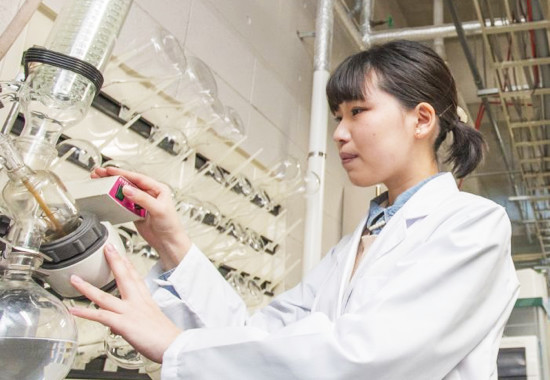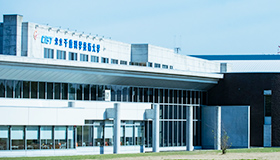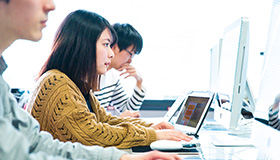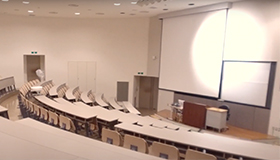Department of Applied Chemistry and Bioscience
Home - English - University information - Faculty of Science and Technology - Department of Applied Chemistry and Bioscience
Developing human resources who can contribute to creating a more prosperous and sustainable future

Students will learn the basics of science and engineering with a focus on chemistry and biology, acquire knowledge and skills that can be applied to various fields of science and technology to contribute to creating a more prosperous and sustainable future.
In addition, through experimental training and graduation research, students acquire knowledge, flexible thinking, communication skills, and problem-solving skills that can be applied to a wide variety of fields and tasks in society.
In addition, through experimental training and graduation research, students acquire knowledge, flexible thinking, communication skills, and problem-solving skills that can be applied to a wide variety of fields and tasks in society.
Department of Applied Chemistry and Biology introduction video
Features of the department
Developing the ability to solve problems faced by modern society using science and engineering
Modern society faces many challenges, including environmental pollution, the search for renewable energy, and increasing the quality of life in an aging society. In order to solve these issues, it is necessary to acquire the ability to use both a "scientific approach" to understand the mechanisms of nature and "engineering thinking" to pursue ways to develop society and industry in harmony with nature.Cultivating human resources with flexible thinking and application skills based on applied chemistry and environmental/biological engineering.
The pillars of study in this department are “applied chemistry” and “environmental/biological engineering”. In the field of applied chemistry, we aim to develop new substances and materials by applying chemical processes and natural phenomena to improve the performance of materials. In addition, in the environmental and biotechnology field, we utilize the excellent functions of living organisms and contribute to the advancement in environmental issues and medical applications. Furthermore, students will acquire computer skills essential for research methods, and develop knowledge, technology, flexible thinking, and application skills.Study fields
Future career paths
- Material industry
Jobs in material manufacturing and evaluation, application to processing industry and medical care, etc. - Medical-related industry
Jobs in manufacture and sales of medical equipment and chemicals, development of medical technology using light, etc. - Electronic information-related industry
Jobs in manufacture of electronic and optical parts, development of equipment, etc. - Continue to graduate school
More advanced and detailed cutting-edge research is possible in graduate courses - Junior high and high school teachers
Teachers who have both expertise and the ability to use ICT
Obtainable licenses:
Type I junior high school teaching license (science), Type I high school teaching license (science)
Description of the individual fields
- Development of new substances and new materials
Organic synthesis / drug discovery / carbon materials / liquid crystal polymers / fluorescent dyes / quantum spin materials - Exploration of material properties
Organic semiconductors / transparent polymers / natural polymer materials / laser wavelength conversion - Biological sample analysis/environmental analysis
Tissue engineering / Herbal medicine / Food analysis / Microplastic / Forest water purification - Bio manufacturing & bioinformatics
Biomimicry / fermentation / enzyme development / ultra-high-performance information processing of living organisms



